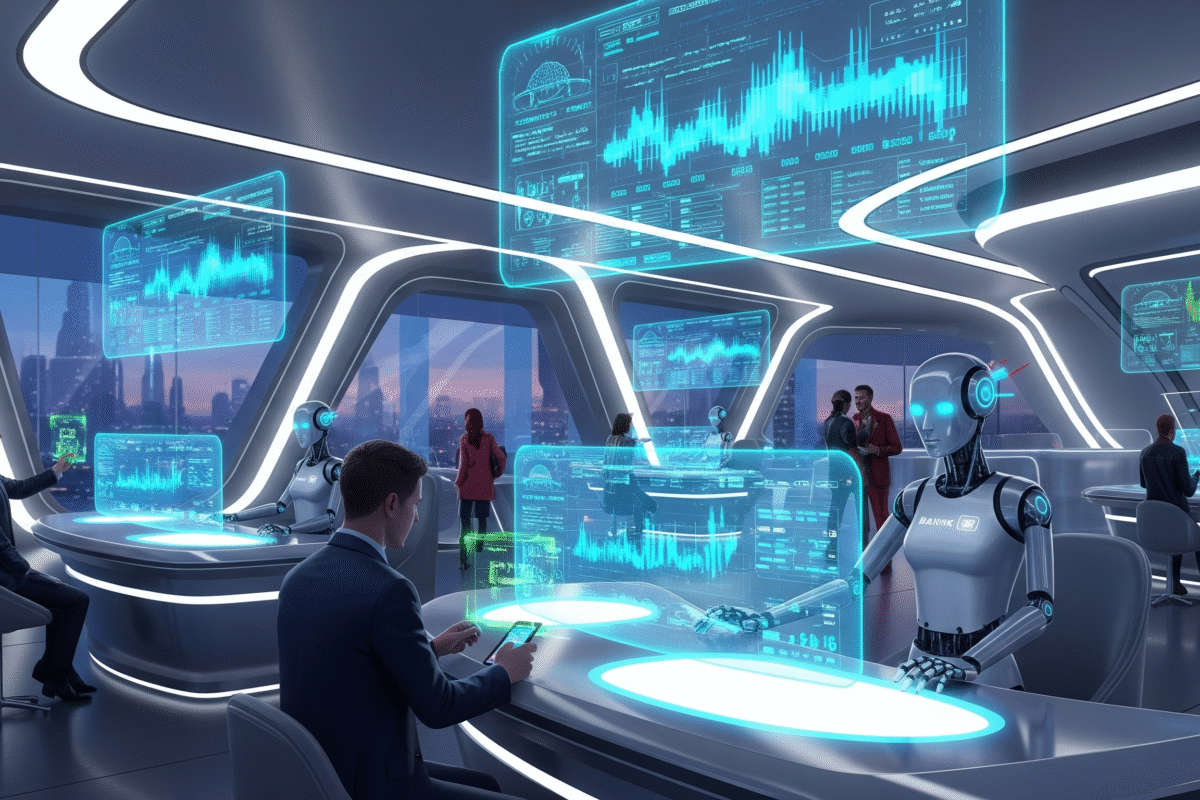Will Banks Still Exist in 50 Years?
Will Banks Still Exist in 50 Years?
One of the most established and potent organizations in human history is the banking system. Banks have protected money, credit, and financial stability for generations. However, given the speed at which blockchain technology, digital currencies, artificial intelligence, and decentralized finance (DeFi) are developing, many people are curious about:
Will banks be around in fifty years?
This issue is now a pressing discussion influencing governments, corporations, and common citizens; it is no longer science fiction. Let’s investigate the options.
HSBC Cashback Credit Card 2025 – Benefits, Rewards & How to Apply?

1.The Function of Banks in Society Today
These days, banks offer more than just check deposit and cash withdrawal services. They
- Protect people’s finances
- Make housing, business, and educational loans available.
- Encourage international trade.
- Provide wealth management and investment services.
- Control the money supply with central banks’ assistance.
But these responsibilities are gradually being undermined by technology. Without using conventional bank accounts, payment applications like PayPal, Venmo, and Cash App already manage billions of transactions. Peer-to-peer transfers without the need for financial middlemen are made possible by cryptocurrencies like Ethereum and Bitcoin.
2.The Rise of Digital-First Banking
Over the past decade, “neobanks” (digital-only banks) have emerged worldwide. Examples include Chime, Revolut, and N26. These banks:
- Have no physical branches.
- Operate entirely online.
- Use AI chatbots for customer support.
- Rely on apps for services like savings, budgeting, and investing.
By 2075, it’s possible that physical bank branches may completely disappear, much like video rental stores vanished after Netflix took over.
3.Will Cash Disappear?
A world without cash is becoming more realistic. Sweden, China, and South Korea are already moving toward cashless economies. Central banks are experimenting with Central Bank Digital Currencies (CBDCs)—government-backed digital money.
If CBDCs replace cash:
- Banks may lose their monopoly on money creation.
- Transactions could happen instantly via smartphones or digital wallets.
- Privacy concerns may grow, as governments could track every transaction.
In 50 years, people may not carry wallets at all. Instead, biometric payments—using fingerprints, eye scans, or even brain signals—could replace cash and cards.
4.Banking with Artificial Intelligence
AI is already transforming banking. Algorithms now:
- Detect fraud in real time.
- Approve or deny loans in seconds.
- Personalize financial advice for customers.
But in 50 years, AI may run entire financial systems without human bankers. Instead of visiting a bank manager for a loan, you could negotiate with an AI system that analyzes your income, behavior, and reputation instantly.
- This raises ethical questions:
- Will AI-driven banks discriminate based on digital profiles?
- Who will regulate AI decision-making?
- Could hackers manipulate AI-powered financial systems?
5. The Impact of Blockchain and Decentralized Finance (DeFi)
Blockchain technology allows transactions without banks. In DeFi, people lend, borrow, and trade assets directly through smart contracts—self-executing agreements written in code.
For example:
- You can take a loan in cryptocurrency without a credit score.
- You can earn interest by lending money to a global pool of users.
- You can trade digital assets 24/7 without bank hours.
If DeFi continues to grow, traditional banks could become obsolete. Instead of a central institution, finance may run on global networks of decentralized nodes.
6.The Future of Central Banks
Even if commercial banks decline, central banks like the Federal Reserve or the European Central Bank may still play a key role. They control monetary policy, regulate inflation, and stabilize economies.
In 50 years, central banks could:
- Issue digital-only national currencies.
- Oversee global cross-border payment systems.
- Compete with private cryptocurrencies and stablecoins.
However, governments might face resistance from citizens who prefer decentralized money over state-controlled digital cash.
7.Big Tech vs. Banks
Tech giants like Apple, Google, Amazon, and Meta are entering finance aggressively. Apple Pay, Google Wallet, and Amazon Pay already process millions of transactions. Meta (Facebook) tried launching its own cryptocurrency, Libra (later renamed Diem).
If Big Tech dominates finance:
- Traditional banks may shrink in influence.
- Customer data will become the most valuable financial asset.
- The line between social media, shopping, and banking will blur.
Imagine a future where your Amazon Prime account is also your bank account, or your Apple ID replaces your credit card.
8.Possible Banking Situations in 50 Years
Scenario 1: Banks Develop Rather Than Vanish
Reimagining oneself is one way for banks to survive:
- becoming businesses that deal with technology.
- providing services that combine DeFi with traditional finance.
- serving as reliable authorities in the tumultuous digital economy.
Scenario 2: Banks Lose Their Use
Banks may completely disappear if blockchain, AI, and DeFi take the role of all financial operations, just like telegram firms did after email.
Scenario 3: A Complicated Prospect
A hybrid system is the most likely result, where:
- Official currencies are under the supervision of central banks.
- Large-scale funding is managed by commercial banks.
- Peer-to-peer transactions are managed by DeFi.
- Consumer payments are dominated by Big Tech.
9.Dangers of a Future Without Banks
A world without banks may seem exhilarating, but there are dangers involved:
- Cybersecurity risks: Hackers could cause economic instability if all money is digital.
- Inequality: People who don’t have access to digital resources could be left out.
- Loss of trust: If not banks, then who will safeguard savings?
- Government overreach: Constant monitoring could be made possible by digital currencies.
10.The Human Factor: Is Trust Still Necessary?
At its core, banking is about trust. For centuries, people trusted banks to store gold, issue paper money, and guarantee transactions. Technology may replace many functions, but human trust may still require institutions.
Even in 50 years, we may still need banks—or bank-like institutions—to reassure us during financial crises.
11.Expert Predictions
- Optimists believe banks will adapt, just like they survived the rise of credit cards, ATMs, and the internet.
- Pessimists argue that in a world of blockchain and AI, banks will vanish like dinosaurs.
- Realists predict banks will shrink, merge, and transform, but some form of banking will always exist.
12.In conclusion, will there be banks in 2075?
The answer is complex. Banks as we know them may not exist in 50 years. Physical branches may disappear, cash may vanish, and AI or blockchain may replace human bankers.
But the core functions of banking—trust, credit, and security—will always exist in some form. Whether managed by banks, Big Tech, or decentralized networks, humanity will always need a system to move money, lend resources, and protect wealth.
Top Tax Deductions for Small Business Owners in 2025 | Maximize Savings
Top Tax Deductions for Small Business Owners in 2025 | Maximize Savings
